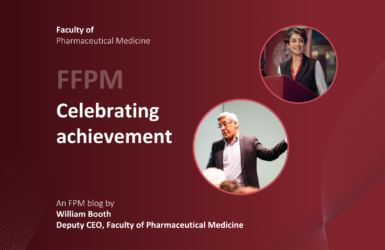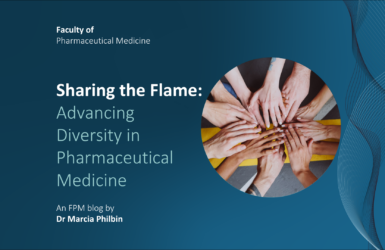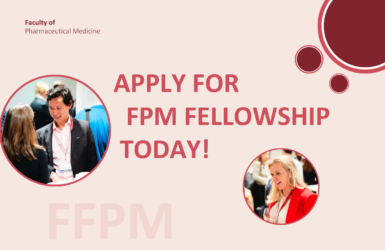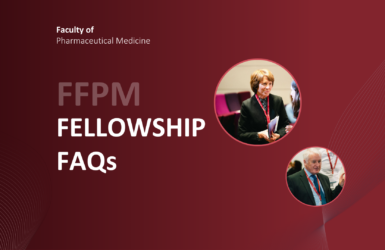Removing barriers, protecting standards
Posted on: Wednesday 5 June 2024
Author: William Booth

This year’s campaign for elections to Fellowship of FPM has finished, and it’s thrown up some very interesting, and very positive, results.
I’ll get onto some of the headline issues in just a moment, but first a quick reminder of some of the developments of the last few months. This year’s Fellowship campaign got underway in February with the roll-out of a revised set of criteria for applications. There were now two routes – a slightly revised version of the traditional route via “big M” Membership (MFPM), and a new direct application route for those not holding current Membership (but who could be Affiliates, or Honorary Members, or have no membership relationship with FPM at all).
All applicants for Fellowship, whether they were applying via Membership or the direct route, were required to be well established in the profession, were expected to have held a substantive post or posts for several years and were required to evidence their contributions to the science and practice of pharmaceutical medicine and to FPM or its mission. They were expected to demonstrate an understanding and experience of the breadth of pharmaceutical medicine, and ongoing and substantial contributions against a variety of possible metrics. Direct applicants were also required to provide a written statement as to why they were applying via that route and not via Membership.
Membership Committee who developed the criteria, and the Board who approved it, were very clear that opening a new route into Fellowship should not be a means of lowering standards or of diluting the meaning or value of Fellowship. Fellowship today means the same thing it has meant in previous years. It recognises achievement at a high level in the profession and it confers peer recognition.
These were all messages that featured prominently in this year’s campaign, and it’s fair to say the results exceeded anyone’s expectations.
Following very careful assessment of all applications and a robust debate when Fellowship Committee met in May, we are pleased to accept 62 new Fellows this year. This is a higher number than seen in recent years, and successful applicants were divided almost equally between the membership route and the direct application route. The number of applications received via the direct route was perhaps a little higher than expected so soon after launch, but the largest proportion of those came from current Affiliates, which came as no surprise given the very calibre of many of our Affiliates.
Whichever the route taken, we are delighted by the very high quality of all our new Fellows. We hope to welcome them all to FPM’s annual Awards Ceremony in London on Wednesday 3 July, and we look forward to seeing them take very active roles within FPM in the months and years to come.
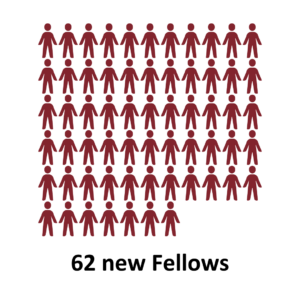
Making the change
So why have we done this – and why do it now?
The first thing to say is, we are not alone in looking at Fellowship in this way. In their deliberations on the issue, Membership Committee and the Board looked at the examples of the Royal Colleges, particularly RCP Edinburgh and RCP London both of whom offer separate but comparable routes for Members and non-Members. One of the early questions asked, then, was, should we revise our own criteria and bring it into line with the Royal Colleges? The answer, it was agreed, was yes.
As said above, the core sentiment that Fellowship recognises achievement at a high level in the profession and confers peer recognition remains unchanged. What has changed, though, is the growing awareness in recent years that there are a number of high calibre, very experienced people occupying senior roles in the profession, some of them already making very positive contributions to FPM, who were not eligible for Fellowship. Opening up a second, robust route to Fellowship alongside the route via Membership was an attempt to be able to bring those people into the fold.
Fellowship, though, is just one piece of the puzzle. Only a small minority of the people employed in the pharmaceutical sector – 1,600 – are current FPM Members, Fellows or Affiliates, or Associates in specialty training. Many of those people may not be suitable for Membership or Fellowship of FPM under its current requirements, but it suggests there is still a lot of growth to be had.
And growth, for FPM as much as any organisation, is vital. In 2023, membership as a whole rose by 1.4%, which was a positive development but not the sort of step change growth which will help to secure FPM’s future in an increasingly competitive space. The rise of the portfolio career means we face challenges from other players in the professional membership sector, and those challenges have been exacerbated by a perception in some parts of the market that FPM is difficult to get into other than for the select few. And, too, there are audiences in the UK and overseas for whom FPM’s existing offer does not reflect their training, skills or seniority.
The challenge is to craft a membership offer which protects, preserves and promotes standards and preserves the value of specialty training in pharmaceutical medicine, in particular – but which removes some of the current barriers to joining. That requires bravery, and a recognition that we all know, work alongside and collaborate with people who could be part of the FPM “family”.
The future
So other than Fellowship, what else are we doing?
Currently, we are exploring the potential for a new route to membership based upon experience in pharmaceutical medicine, to complement the existing qualifying route via the Diploma in Pharmaceutical Medicine (DPM) or one of the other nine accepted qualifications. By way of a quick reminder, the full list of qualifications accepted is as follows:
- Diploma in Pharmaceutical Medicine – FPM
- Diploma in Human Pharmacology – FPM
- Diploma in Experimental Therapeutics – FPM
- Diploma in Pharmaceutical Medicine – Free University, Brussels, Belgium
- CEMDC Cooperative European Medicines Development Course – Semmelweis University, Budapest, Hungary
- Masters / Diploma in Pharmaceutical Medicine – Trinity College Dublin, Ireland
- Masters / Diploma in Pharmaceutical Medicine – Hibernia College, Dublin, Ireland
- Masters in Preclinical and Clinical Research and Development of Drugs – University of Milano Bicocca, Italy
- Diploma in Medicines Development – Stellenbosch University, Western Cape, South Africa
- Diploma of Advanced Studies in Pharmaceutical Medicine – University of Basel/ECPM, Switzerland
- Diploma in Pharmaceutical Medicine – James Lind Institute, Geneva, Switzerland
- Masters / Diploma in Pharmaceutical Medicine – University of Surrey, UK
Once again, in exploring a route based upon experience rather than qualification the focus is upon investigating ways to remove the barriers to joining whilst maintaining the high standards expected for Membership.
A route based upon experience is not intended or expected to be an “easy” alternative for those candidates who wish to avoid taking FPM’s exams – indeed, it may well prove to be the more difficult of the two. The DPM, mapped to the 13 sections of the current PharmaTrain syllabus, will remain the gold standard for Membership and the benchmark against which all applications based upon experience will be measured. Evidencing a comparable depth and breadth of understanding in pharmaceutical medicine will rightly prove challenging.
Membership Committee are looking at the “experience” route now and the hope is a suitably robust proposal will be in shape for the Board to consider in the autumn for possible roll-out in early 2025.
We also hope in the months to come to build a pipeline of people who are interested in coming into the profession and thence into membership of FPM itself. You will have seen one of our first initiatives in that area in the form of the new “Pharmaceutical Medicine In A Day” course. The course has run twice this year already, both times to very healthy numbers, and it has generated a great deal of interest from early career/ junior doctors in specialty training and membership itself. In the months to come, we will be looking at how we might bring those people into the fold on more of an ongoing basis – again, from 2025.

The work of shaping, honing and launching new pathways into membership of FPM is very complex, but this is a marathon, not a sprint. The hope with all this work is to help prepare FPM for a future where it enjoys greater financial security, where it truly embodies and represents the breadth and diversity of the profession, and above all where it continues in its ongoing mission to advance the science and practice of pharmaceutical medicine, and to set and uphold the very highest scientific and ethical standards.
FPM would like to thank everyone who’s been involved in the work to date and in the future. Their input is very much appreciated.
The FPM Annual Awards Ceremony 2024 will be held on Wednesday 3 July at the Royal College of Physicians in London. Attendance is by invitation only. For more information, see here.
William Booth
Deputy Chief Executive, Faculty of Pharmaceutical Medicine

